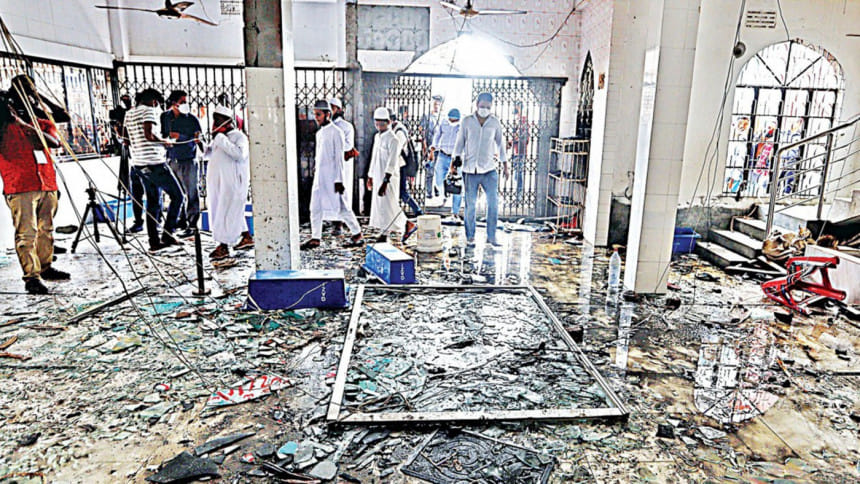Narayanganj Mosque Fire: Authorities must pay for their negligence

On Friday night, a massive explosion took place in Baitus Salah Jame Masjid in Narayanganj, killing 24 people and injuring dozens more, most of whom have sustained over 70 percent burn injuries.
Eye witnesses described that they heard a huge explosion, the shattering of windows and sparks of fire escaping, followed by screams of despair coming from inside the mosque. Then the worshippers started fleeing, many burnt from head to toe, and in a desperate attempt to douse the fire, started rolling on the ground and helplessly pleaded onlookers to be saved. The onlookers wanted to help but feared for their own safety as the road leading to the mosque was clogged with drain water, and they suspected that the water may have come in contact with electricity, which could then electrocute them.
The locals clarified that the road has been perpetually clogged with drain water, irrespective of rainfall, due to lack of maintenance. The water clogging has itself caused accidents, since many pedestrians have slipped and injured themselves in the past, while it also makes the mosque inaccessible to cars and rickshaws. Therefore, the rescuers had to carry them by foot to the vehicles. They blamed the authorities for this lack of repair: "If the authorities had repaired this road, we could have tried to rescue the burn victims much earlier".
It is only after the fire service came and started their rescue mission that the locals felt confident enough to also join in. Yet they were aghast at the sheer extent of injuries: entire bodies burnt, head to toe. They could not find the courage to touch them—because not one part of the body looked like it could withstand even the slightest touch. There were four children inside the mosque, one of them had become totally unrecognisable. Not one hair was left unburnt. This was possibly the body of the seven year old child Jewel, who is listed among the casualties.
Primary inspections by the fire services found that a Titas Gas pipeline is situated underneath the mosque floor and caused a gas leak. As the windows were shut, the gas had accumulated inside the mosque, causing six air conditioners to burst one after the other, possibly when the power was triggered.
Four separate "probe" committees have been formed by four different bodies to find out the cause and who is at fault: Narayanganj district administration, Narayanganj Fire Service and Civil Defence, Titas Gas Transmission and Distribution Company Ltd or the Dhaka Power Distribution Company (DPDC). While a prompt response is always welcome, when was the last time any such probe body helped deliver justice and amounted to more than just palliative eye wash? As for the probe body formed by Titas Gas itself, can a company really be expected to objectively ascertain its own negligence? Additionally, the Narayanganj Zone Manager of Titas Gas, Mofizul Islam, is part of the five member committee formed by the Narayanganj district administration. Is the presence of a manager of the very company accused of negligence in the district administration's probe committee conducive to an effective investigation?
The President of the mosque committee, Abdul Gafur, alleged that the mosque committee had informed Titas of the gas leak in December 2019 when it first appeared, and requested for it to be repaired. The committee made a verbal complaint yet again last month, when the gas leak became even more apparent. However, Titas allegedly refused to carry out the repairs unless Tk 50,000 was paid as "bribes". The committee was unable to accumulate the demanded sum, and therefore the gas line remained unrepaired. While breaking into tears, Abdul exclaimed, "Their negligence and greed for money claimed so many lives. Who will be responsible for this now?"
Titas Gas Managing Director, Ali Mohammad, spoke to the press while visiting the site of the explosion, and "warned its employees of stern action if their negligence is found". Yet who is going to take stern action against Titas Gas, as an entity, if negligence (which is seeming increasingly apparent) is found on their part? Under general principles of tort law (which deals with negligence and personal injury), if Titas Gas employees are in fact found to have been negligent, then Titas Gas, as their employer, is vicariously liable for their employees' negligence and must compensate the victims who were harmed. Through vicarious liability, tort law forces corporations like Titas Gas to behave more responsibly, since a corporation cannot simply escape responsibility by scapegoating a handful of its employees whenever a horrible disaster takes place and harms human lives. By being forced to pay a price, corporations are subject to institutional accountability and compelled to ensure their actions (or inactions) do not cause harm to other people. Yet corporations in our country have been free to harm as many people as they like in their relentless pursuit of profit, since tort law remains largely unenforced and underdeveloped. Whenever disaster strikes and outrage manifests, a handful of poor, usually uneducated, employees are thrown in jail, while corporations escape accountability.
From Nimtoli to Chawkbazar to FR Tower to United Hospital, greed-induced negligence has killed scores of people, because time and time again, corporations were allowed to profit at the cost of human lives. Now, the Narayanganj mosque fire has killed even more people, because not even the house of God is safe from the perils of human negligence. With each of the past fire disasters, probe committees were duly set up, strong statements were made in the press promising justice, accountability and change. Yet after the initial outrage eventually dissipated, business carried on as usual since tort law, the one action that could have created lasting accountability, remained inaccessible to the victims.
How many more wholly preventable fires have to break out and burn our fellow citizens, before we realise that until negligent corporations are slapped with a price to pay for putting profit above human lives (through the proper enforcement and development of tort law), nothing will ever change?
Taqbir Huda is a Research Specialist at Bangladesh Legal Aid and Services Trust (BLAST) and coordinates the Tort Law Project Bangladesh.
Email: [email protected]

 For all latest news, follow The Daily Star's Google News channel.
For all latest news, follow The Daily Star's Google News channel. 



Comments